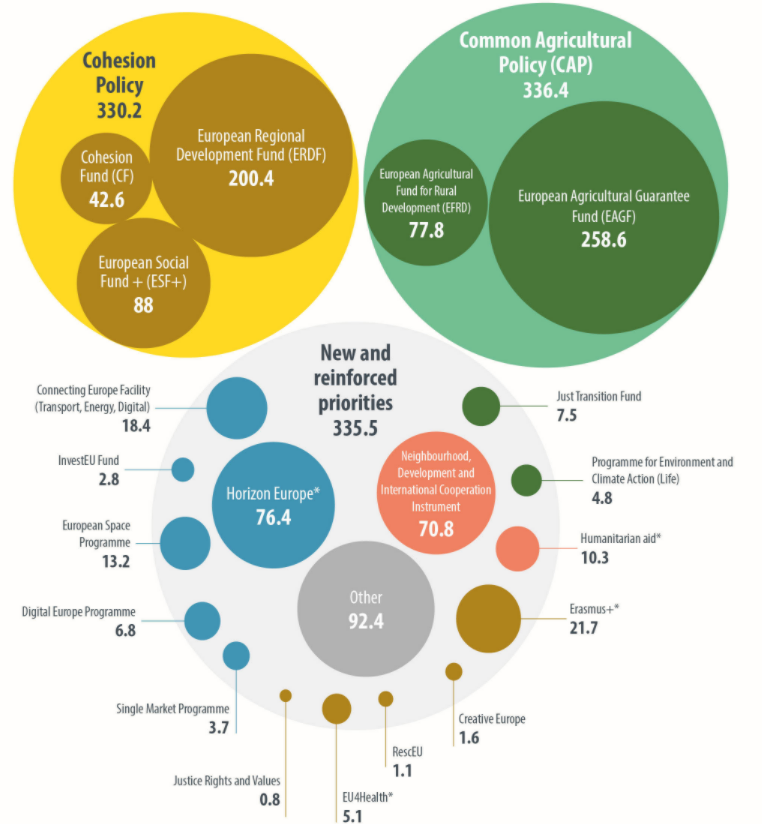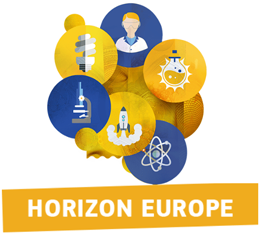At the European level, the Budget is set in « multiannual frameworks » covering several years. The current budget covers 2021 until 2027 and reaches €1074 bn. It has been significantly increased due to the Covid pandemic. It is ventilated in the different areas of action of the European Union as presented below.
For more information on the European budget, visit this link.
Quick tips on European funding:
- To receive European funding, projects and initiatives have to contribute to fulfill the objectives of the EU: it needs to have impact at the EU level, involve several partners, contribute to achieve specific goals, etc.
- Not all projects can receive EU-funding as, irrespective of their possible impact, they need to met specific criteria.
- Each funding mechanism has its own rules, criteria, timeline and budget.
- Applying for EU-funding is resource-intensive and needs to be prepared.
- Look at the calls and proposals to see which Funding mechanism is available or which call could be of interest : https://ec.europa.eu/info/funding-tenders/opportunities/portal/screen/opportunities/topic-search
In the field of Health, there are different funding mechanisms that can be triggered to support projects and initiatives. The most relevant funds as far as health is concerned are: Horizon Europe, EU Health Programme and Digital Europe.
Horizon Europe is the EU’s key funding programme for research and innovation with a budget of €95.5 billion.
Horizon Europe is the EU’s key funding programme for research and innovation with a budget of €95.5 billion. It tackles climate change, helps to achieve the UN’s Sustainable Development Goals and boosts the EU’s competitiveness and growth.
The programme facilitates collaboration and strengthens the impact of research and innovation in developing, supporting and implementing EU policies while tackling global challenges. It supports creating and better dispersing of excellent knowledge and technologies. It creates jobs, fully engages the EU’s talent pool, boosts economic growth, promotes industrial competitiveness and optimises investment impact within a strengthened European Research Area.
The EU4Health Initiative was adopted as a response to the COVID-19 pandemic and to reinforce crisis preparedness in the EU. The pandemic highlighted the fragility of national health systems.
The initiative will bring a contribution to the long-term health challenges by building stronger, more resilient and more accessible health systems. Health is an investment and, with a €5.3 billion budget during the 2021-27 period.
EU4Health brings an EU added value and complements the policies of the Member States to pursue four general objective representing the ambitions of the programme and ten specific objectives representing the areas of intervention:
- Improve and foster health.
- Health promotion and disease prevention, in particular cancer.
- International health initiatives and cooperation.
- Protect people.
- Prevention, preparedness and response to cross-border health threats.
- Complementing national stockpiling of essential crisis-relevant products.
- Establishing a reserve of medical, healthcare and support staff.
- Access to medicinal products, medical devices and crisis-relevant products.
- Ensuring that these products are accessible, available and affordable.
- Strengthen health systems.
- Reinforcing health data, digital tools and services, digital transformation of healthcare.
- Enhancing access to healthcare.
- Developing and implementing EU health legislation and evidence-based decision making.
- Integrated work among national health systems.
The Digital Europe Programme (DIGITAL) is a new EU funding programme focused on bringing digital technology to businesses, citizens and public administrations. It aims to accelerate economic recovery and drive the digital transformation of Europe.
The Digital Europe Programme will strengthen investments in a range of areas, including:
- Supercomputing and data processing capacities.
- Core Artificial Intelligence (AI) capacities such as a data spaces and libraries of AI algorithms.
- Cybersecurity.
- Digital skills, expanding the best use of digital capacity in EU’s society and economy.
- Support to the digitalisation of businesses and public administrations.
Other European funds can support projects and initiatives but in an indirect way (i.e Cohesion fund, Social fund, etc.).






